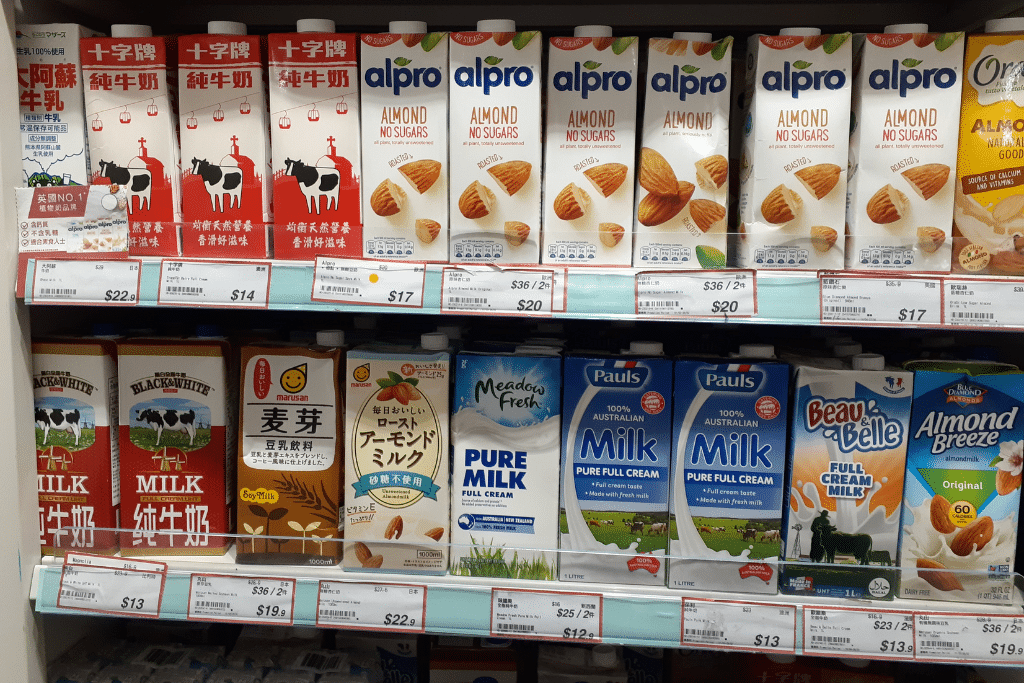An increasing number of people around the world are adopting sustainable diets as an act to fight climate change. As a result, the popularity of plant-based milks has skyrocketed in the past decade. However, there has been a growing debate with regard to the retail price of these plant-based milk products. Is the upcharge of vegan milk justified by its high production cost and smaller market size compared to traditional milk? Or would it be better to reduce the price of plant-based milk in order to make this sustainable alternative more accessible to the public?
—
How Popular Are Vegan Diets Worldwide?
In recent years, a sustainable plant-based diet has taken over the internet. Google searches for the term “veganism” have increased by 580% over the last five years alone. In 2021, the global vegan market size reached nearly US$16 billion and it is expected to reach $22 billion by 2025.
As participation in the vegan diet continues to rise, consuming plant-based milk becomes an easy and common method for vegans, vegetarians, and other climate-conscious people to take action against climate change. According to the Vegconomist’s Global Plant-based Milk Market Report 2023, the global market size of plant-based milks reached US$35 billion in 2021 and has skyrocketed to a staggering $123.1 billion in 2023.
Why Are Plant Based Milks Rising To The Top, And Why Do They Have Such A High Retail Price?
The interest around vegan milks is rising for numerous reasons. According to a 2021 survey by Euromonitor, 40% of consumers switched to non-dairy milk to improve their digestive system’s health. The survey also found that 40% of people turned to plant-based alternatives for the general reason of feeling healthier, while 27% of consumers felt that they were making an environmentally ethical choice by switching to plant-based alternatives.
Despite its immense popularity, the price of plant-based milk remains a highly-debated issue amongst consumers. According to a Mintec study comparing the retail price of dairy and plant-based milks, the retail prices for the latter are around twice that of conventional milk. The study also shows that the different characteristics of dairy and plant-based drinks industries have caused the price gap between dairy milk and vegan alternatives to widen. But what exactly is behind this significant price difference?
First of all, the age of the industry and market size of each respective milk type affects its retail prices. According to the same study, the market size for dairy milks was $600 billion, and its industry had been existing for over 100 years. In contrast, the market size for plant-based milks is relatively small, and only accounted for 4-6% of the milk market globally at the time of the study.
Supplier landscape and ownership also play a role in determining the retail price of both types of milk. For dairy products, the supplier landscape varies significantly by country. For example, larger developed countries have dairy companies that are large global players, meaning that the company is recognised worldwide. These global players have a revenue of $10-20 billion/year.
On the other hand, the supplier landscape of non-dairy milk is limited, with only a few global players. Moreover, the industry of the latter type of milk consists mainly of a growing number of small start-up companies, with sales ranging between $5-50 million.
Supplier ownerships of each respective milk type also influences its retail price. Dairy milk businesses are often co-operative across many sectors, while plant-based milks are often privately owned.
The number of manpower that is available for producing the respective type of milk also determines the retail price. Dairy milk production has a large supply of manpower. With its heavy reliance on on-farm production and central bottling in factories, the price becomes affordable.
On the other hand, it is more difficult for vegan milk companies to recruit large amounts of manpower, as small start-ups often cannot afford to produce milk by themselves and instead have to rely on contract manufacturers. Relying on third party suppliers, however, inevitably raises the costs of the final product.
You might also like: 10 Leading Sustainable Food Companies to Support in 2023
Pros of Reducing the Price of Plant-Based Milk
One side of the debate advocates for reducing the cost of plant-based milks. The high retail price of these products is one of the biggest issues when it comes to attracting new consumers to a vegan diet – especially people belonging to lower-middle classes whose first priority is often the product’s affordability.
This opinion is supported by a Fauntalytics analysis on bringing back former vegans and vegetarians. The survey found that several ex-vegans’ decision to quit their plant-based diet was influenced by the high price of vegan products. In another survey conducted by Green Queen, an impact media platform advocating for social & environmental change based in Hong Kong, 58% of the surveyed people agreed that being vegan was expensive.
Removing the upcharge for non-dairy milks – many argue – could be a solution to remove the expensive reputation of veganism and thus encourage newcomers to a vegan lifestyle.
Hubster, an Australian delivery management and optimisation platform, suggests that removing the upcharge for plant-based milks could be beneficial to building a cafe’s customer base. Dropping the upcharge would give a friendlier and more authentic impression to customers, thereby establishing a loyal customer base and increasing the company’s profits.
However, Hubster suggests that the profit margin of the company should be prioritised above everything else – especially with newly established companies that are struggling to establish a stable flow of income with its small and underdeveloped customer base. Hubster suggests that these companies keep the upcharge of plant based milks, while ensuring that the price they set is reasonable. With this strategy, the company is still able to reach a profit margin and at the same time establish a loyal customer base. The website also suggests that companies set a realistic average weekly sales figure, taking into account whether the pricing of vegan milk alternatives can cover the costs of vegan milk alternatives in the first place.
Cons Of Reducing the Price of Plant-Based Milk
Even though plant-based milks are generally marketed as eco-friendly and sustainable, some types are associated with unethical practices. Unfortunately, increasing popularity of plant-based milks could inherently result in more unethical practices as companies increase production.
One of the most commonly consumed plant-based milks is almond milk. However, according to the BeeKeepClub, a resource guide for beekeepers, the high demand for almond milk raises ethical concerns about the livelihood of bees. Beekeeper’s main concern related to almond production is the effect of pesticides on bees. Almond fields rely heavily on honeybees for pollination, but the constant exposure to pesticides represents a huge threat to these animals.
This theory is supported by a series of studies conducted by Ohio State University in early 2019, which found that the death of bees is highly linked to pesticides used during pollination processes.
Another example of how plant-based milks could be considered unethical towards the environment is Oatly, a hugely popular vegan milk brand, and its ties with the Blackstone Group, a company infamous for having ties with deforestation. Oatly’s relationship with the Blackstone Group has inevitably tainted its image of being a transparent and eco-friendly company.
In 2020, Blackstone Group bought a 10% stake for $200 million for its investment in Oatly, and it has caused controversy within the vegan and vegetarian community, as Blackstone is known to have ties with deforestation in the Amazon rainforest.
According to an article published on The Intercept, the Hidrovias do Brasil, a company mostly owned by Blackstone, owns and regulates the Amazon terminal. The terminal is responsible for allowing farmers to access the Amazon to load soybeans on barges and other grains to be exported to the world.
These unethical practices are affecting the popularity of these sustainable milk alternatives, hindering attempts to grow consumers of such products.
The Final Verdict: Do We Reduce The Price Of Plant-Based Milks?
A reduction of the retail price of plant-based milks comes with several benefits and drawbacks. Reducing the retail price of non-dairy milks shows that embarking on a vegan diet can be affordable, therefore attracting more newcomers to participate in a vegan diet.
At the same time, however, reducing the retail price of these milk alternatives could result in higher demand, something that might push companies to adopt unethical practices to maximise production and profit.
You might also like: How Veganism Can Help Ease the World’s Land Use Crisis


















